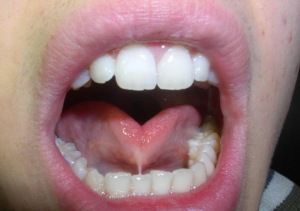News
Danish parents going abroad for tongue-tie surgery on their infants
This article is more than 7 years old.
Doctors in the Netherlands are willing to perform tongue operations that Danish doctors are reluctant to attempt

All it takes is a small cut to the band under the tongue (photo: Klaus D. Peter)
Some children find it difficult to breastfeed because their frenulum (the band of tissue that connects the bottom of the tongue to the floor of the mouth) is too short and tight, causing the movement of the tongue to be restricted. The condition is known as tongue-tie.
READ ALSO: Danish mothers yearning for better breastfeeding guidance
If tongue-tie is causing breastfeeding difficulties, there is a simple procedure called a frenetomy that can quickly correct the problem.
The doctor simply clips the frenulum to loosen it and allow the tongue full range of motion. It takes less than a second and is relatively painless, according to Anne Smith, a member of the international board of lactation consultants writing on BreastfeedingBasics.com.
Could be collateral damage
Danish ear, nose and throat doctors tend not to want to perform the operation to cut the frenulum, or if they are prepared to do it they say a full anaesthetic is necessary. They also point out there is a risk that important nerves and blood vessels under the tongue might get damaged.
According to Smith, part of the reason frenotomies fell out of favour was because doctors discovered that speech, in all but the most severe cases, was not affected by tongue-tie. They preferred to take a “wait and see” approach and let nature take its course. Most of the time, the frenulum would stretch out on its own with no intervention.
A minimal risk
Doctors in the Netherlands, on the other hand, are far more willing to operate and that has led to at least 120 families travelling there for help, DR Nyheder reports.
“The risk is extremely small,” said Kirsten Slagter, a Dutch surgeon working in a clinic that specialises in the procedure to cut the back part of the frenulum.
Some Danish doctors would like to be able to perform the operation, but there are disagreements as to how the children ought to be treated. “The implications of tongue-tie are controversial in medical circles,” said Thomas Hjuler, a senior consultant at Copenhagen’s Rigshospitalet.
Smith adds that as the number of mothers initiating breastfeeding increases, so will the number of healthcare providers who are aware of the impact tongue-tie has on nursing infants and know how to diagnose and correct it.










































